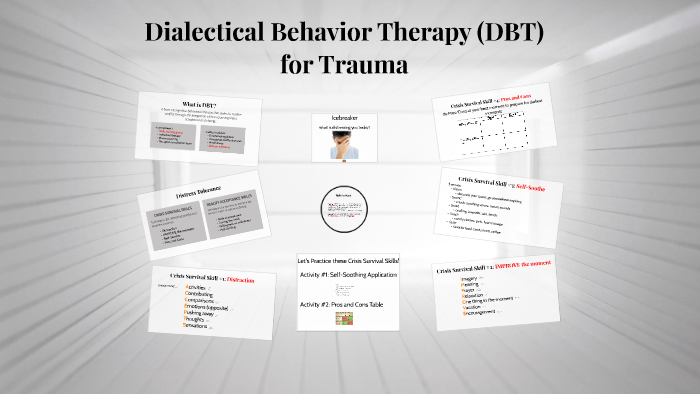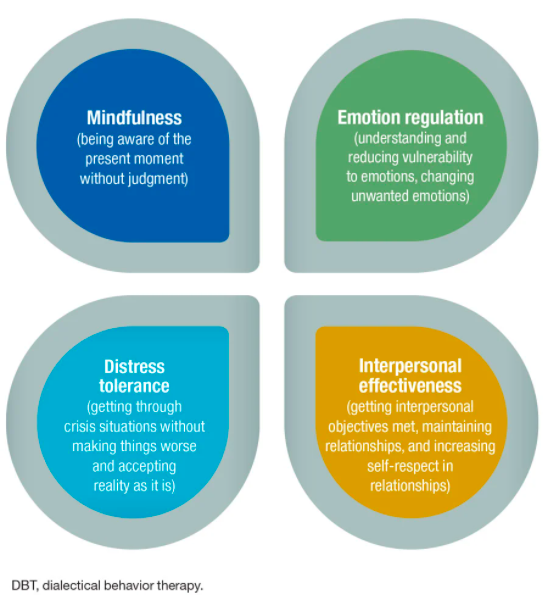- .Cognitive Behavioral Therapy Training Courses 'Master Clinician' training in cognitive behavioral therapy (CBT) methods enables learners to become highly skilled in the major forms of CBT for most child mental health, behavioral and emotional disorders.
- Cognitive behavioral training (CBTraining) is a cognitive-based process designed with the aim to systematically break down emotionally driven dependencies and behaviors, replacing them with behaviors that are based on rational choice.
- Dialectical Behavioral Therapy Training
- Encouragementdialectical Behavioral Training Classes
- Encouragementdialectical Behavioral Training Certification
- Encouragementdialectical Behavioral Training Jobs
Dialectical Behavioral Therapy Training
Behavior & Training. Everyone wants a well-behaved dog. Get tips for starting off on the right foot, training an older or rescue dog, and correcting problem behaviors. Training Your Dog. Training Your Dog: Why You Should Do It Why it pays to train, which techniques work, and which don't. Treatments come to life in our online training courses with interactive activities and expert content. Earn CE/CME credit. Streaming Videos. Our collection of online videos is a smart, accessible choice for providers and consumers. Training Affiliates. Black beauty progenyamerican meadow's equestrian center camp. Learn about our network of international training affiliates who provide DBT training.
Behavioural TrainingBehavioural Training is an extremely important element of all corporate training programs for companies as globally it is recognized in inculcating the right attitude in their employees. 'If you want to change attitudes, start with a change in behaviour', says Dr. William Glasser who is the great psychiatrist from the US. The modification in behaviour necessitates them to unlearn what is exisitingly deep-rooted in them over a time and imbibe new behavioural skills.

What is behavioural skills training?
Behavioural skills training is a blend of skills that are required in interpersonal relationships, effective communication, engaging attitudes and productive emotions that will allow employees to work & perform well with their colleagues. In other words, it aids individuals to analyse their existing behaviour patterns, and trains them with new skills to recognize new patterns to achieve better results. Therefore, these programs are a key part of leadership training.
Behavioural Skills Training
The latest addition to our services is providing microlearning content. This will help to enhance learning and retention of our courses. It is a form of e-learning through which the latest generation learns.
Read more- Facilitate and Coach: Offer precise, positive feedback; Have frequent, one-on-ones, presenting solutions to problems, personalized to your employees' specific strengths.
- Macromanage and avoid micromanaging: Good leadership skills helps you to strike a balance in giving liberties to your employees, while still being within reach for guidance.
- Be concerned about the well-being of your team members: Recognize your employees as individuals with lives outside work.
- Be courageous about obtaining results: Facilitate the team in prioritising their work and use your position to eliminate roadblocks.
- Communicate with efficacy: Effective communication skills are a two-way street: you both listen and contribute to information. This helps the team to connect the dots.
- Be Team Focused: Be earnestly involved in the career development of your team.
- Clarity of Vision: Have a clear vision with supporting strategy.
- Self-Development: Have the necessary skills so that the team can fall back on you.
Mr. Lazlo Bock, Google's Vice-President for People Operations says, he is surprised by the simplicity of the rules. This simplicity not only creates ease in the application but also does not require a personality transplant for a manager.
Mr. Bock says, 'You don't actually need to change who the person is' he says. 'What it means is, if I'm a manager and I want to get better, and I want more out of my people and I want them to be happier, two of the most important things I can do is just make sure I have some time for them and to be consistent. And that's more important than doing the rest of the stuff.'
The latest addition to our services is providing microlearning content. This will help to enhance learning and rentention of our courses. It is a form of e-learning through which the latest generation learns.
Behaviourial Training Outline
Training Topics:

Personal Grooming & Etiquette
Encouragementdialectical Behavioral Training Classes
- Social Graces, Etiquette and Body language
- Making a Great First Impression:
- How to present yourself to people
- Greetings, Introductions
- Developing Your Professional and Personal Image
- Personal Hygiene
- Polish interpersonal skills
- Etiquette of Dressing:
- The do's and don'ts in dressing
- Understand various dress codes for different occasions
- Clothes and Corporate Culture
- The Do's and Don'ts in Conversation:
- Enhance communication skills
- Build self-confidence and self-esteem
- Rapport building
- Making a Great First Impression:
Interpersonal Skills
- The Basics of Interpersonal Communication
- Starting and sustaining conversations that are engaging
- Handling conversations with the opposite sex
- Acknowledging differences
- Giving and receiving compliments
- Coming across as a positive person
- Avoiding bad conversational habits
- Displaying Courteousness and Thoughtfulness at the Workplace
- Being thoughtful to colleagues regardless of position
- Sticking to convictions as diplomatically as possible
- Apologizing
- Showing appreciation
- Extending courtesy to guests, consultants, and new employees
E-Mail Etiquette
- General etiquette
- Sending effective messages
- Form and tone of the messages
- Responding to messages
- Organizing the different parts of an email:
Greeting | Enclosures |
Closing | CC & BCC |
Subject Line | Screen Appearance |
Spacing | Font |
Replying | Flaming |
Telephone Etiquette

- Taking calls
- Making calls
- Do's and Don'ts over the telephone
- Cell Phone Etiquette
Encouragementdialectical Behavioral Training Certification

Business Communication
The Building Blocks of Effective Business Communication
- Structuring communication:
- Having a clear objective
- Highlighting critical points
- Being clear and concise
- Understanding the audience
- Listening
- Active Listening
- Reflective Listening
- Passive Listening
Training Hours:
The Campus to Corporate Training Program will be 16 hours spread across 2 days.
Behavioural Training in Chennai
Behavioural Training in Mumbai

What is behavioural skills training?
Behavioural skills training is a blend of skills that are required in interpersonal relationships, effective communication, engaging attitudes and productive emotions that will allow employees to work & perform well with their colleagues. In other words, it aids individuals to analyse their existing behaviour patterns, and trains them with new skills to recognize new patterns to achieve better results. Therefore, these programs are a key part of leadership training.
Behavioural Skills Training
The latest addition to our services is providing microlearning content. This will help to enhance learning and retention of our courses. It is a form of e-learning through which the latest generation learns.
Read more- Facilitate and Coach: Offer precise, positive feedback; Have frequent, one-on-ones, presenting solutions to problems, personalized to your employees' specific strengths.
- Macromanage and avoid micromanaging: Good leadership skills helps you to strike a balance in giving liberties to your employees, while still being within reach for guidance.
- Be concerned about the well-being of your team members: Recognize your employees as individuals with lives outside work.
- Be courageous about obtaining results: Facilitate the team in prioritising their work and use your position to eliminate roadblocks.
- Communicate with efficacy: Effective communication skills are a two-way street: you both listen and contribute to information. This helps the team to connect the dots.
- Be Team Focused: Be earnestly involved in the career development of your team.
- Clarity of Vision: Have a clear vision with supporting strategy.
- Self-Development: Have the necessary skills so that the team can fall back on you.
Mr. Lazlo Bock, Google's Vice-President for People Operations says, he is surprised by the simplicity of the rules. This simplicity not only creates ease in the application but also does not require a personality transplant for a manager.
Mr. Bock says, 'You don't actually need to change who the person is' he says. 'What it means is, if I'm a manager and I want to get better, and I want more out of my people and I want them to be happier, two of the most important things I can do is just make sure I have some time for them and to be consistent. And that's more important than doing the rest of the stuff.'
The latest addition to our services is providing microlearning content. This will help to enhance learning and rentention of our courses. It is a form of e-learning through which the latest generation learns.
Behaviourial Training Outline
Training Topics:
Personal Grooming & Etiquette
Encouragementdialectical Behavioral Training Classes
- Social Graces, Etiquette and Body language
- Making a Great First Impression:
- How to present yourself to people
- Greetings, Introductions
- Developing Your Professional and Personal Image
- Personal Hygiene
- Polish interpersonal skills
- Etiquette of Dressing:
- The do's and don'ts in dressing
- Understand various dress codes for different occasions
- Clothes and Corporate Culture
- The Do's and Don'ts in Conversation:
- Enhance communication skills
- Build self-confidence and self-esteem
- Rapport building
- Making a Great First Impression:
Interpersonal Skills
- The Basics of Interpersonal Communication
- Starting and sustaining conversations that are engaging
- Handling conversations with the opposite sex
- Acknowledging differences
- Giving and receiving compliments
- Coming across as a positive person
- Avoiding bad conversational habits
- Displaying Courteousness and Thoughtfulness at the Workplace
- Being thoughtful to colleagues regardless of position
- Sticking to convictions as diplomatically as possible
- Apologizing
- Showing appreciation
- Extending courtesy to guests, consultants, and new employees
E-Mail Etiquette
- General etiquette
- Sending effective messages
- Form and tone of the messages
- Responding to messages
- Organizing the different parts of an email:
Greeting | Enclosures |
Closing | CC & BCC |
Subject Line | Screen Appearance |
Spacing | Font |
Replying | Flaming |
Telephone Etiquette
- Taking calls
- Making calls
- Do's and Don'ts over the telephone
- Cell Phone Etiquette
Encouragementdialectical Behavioral Training Certification
Business Communication
The Building Blocks of Effective Business Communication
- Structuring communication:
- Having a clear objective
- Highlighting critical points
- Being clear and concise
- Understanding the audience
- Listening
- Active Listening
- Reflective Listening
- Passive Listening
Training Hours:
The Campus to Corporate Training Program will be 16 hours spread across 2 days.
Behavioural Training in Chennai
Behavioural Training in Mumbai
Encouragementdialectical Behavioral Training Jobs
Behavioural Training in Hyderabad
Clients Receive Behavior Coaching To Target Some Or All Of The Following Areas:
- Daily/Independent Living
- Organization/Planning
- Executive Functioning
- Anxiety/Coping
- Interpersonal Relationships
- Social Integration
Enjoy A Consistent And Premium Level Of Treatment
A Behavior Plan developed by one of our Master's level behavior therapists targets specific areas that will improve a client's life and lead to happy, healthy and productive choices. Behavior coaches are trained to implement the Behavior Plan that is specifically developed for a client, and rely upon a family approach to treatment—parents and siblings are active participants in the development and implementation of a Behavior Plan.
Daily data, progress notes, and monthly treatment evaluations and summaries are performed to ensure the appropriateness of the Behavior Plan and to determine if any additional training or modification is required. Meetings with case managers and other providers creates a consistent plan and continuity of care.
S.E.E.K. Arizona offers in-home behavior coaching support for clients receiving services through the RBHA, DDD, private insurance, and private pay. Please contact our office to request more information regarding behavior coaching for your family member, or to request an initial consultation.
